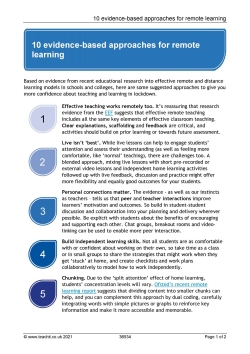10 evidence-based approaches for remote learning

A set of ten approaches to support remote learning, based on recent educational research. Includes suggestions for building students' independent learning skills, using low stakes assessment and questions effectively and managing concentration issues, as well as chunking information and dual coding.
An example tips from the resource:
- Personal connections matter. The evidence – as well as our instincts as teachers – tells us that peer and teacher interactions improve learners’ motivation and outcomes. So build in student-student discussion and collaboration into your planning and delivery wherever possible. Be explicit with students about the benefits of encouraging and supporting each other. Chat groups, breakout rooms and video-linking can be used to enable more peer interaction.
- Effective teaching works remotely too. It’s reassuring that research evidence from the EEF suggests that effective remote teaching includes all the same key elements of effective classroom teaching. Clear explanations, scaffolding and feedback are critical, and activities should build on prior learning or towards future assessment.
All reviews
Have you used this resource?
Review this resource02/03/2021
15/02/2021
05/02/2021
05/02/2021
Lovely to have a check list of ideas in one place during this Pandemic.
05/02/2021
01/02/2021
27/01/2021
26/01/2021
